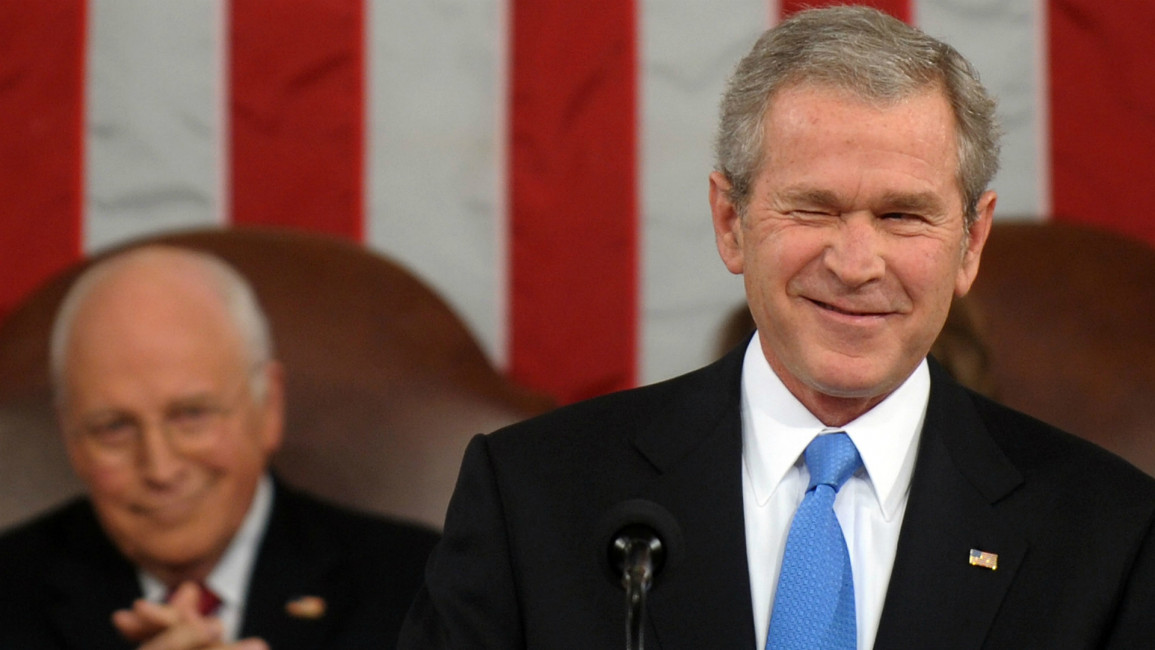
Iraq's war never ended and has no end
Iraq's war never ended and has no end
Comment: The fall of Baghdad set in motion a war of terror that now spins out of control, creating its own enemies and perpetuating its own logic, says Sam Hamad.
3 min read
Bush's lies and deceptions unleashed chaos, not freedom [AFP]
The fall of Baghdad to the Americans, 12 years ago today, unleashed chaos in the region and continues to actively shape the world in a negative manner.
The US occupation ended in 2011 but the war continues. Those who say otherwise are either ignorant or, in keeping with the spirit of the war and the nature of its architects, wilfully deceptive.
The war was built on a mountain of lies, namely the idea that Saddam Hussein had stockpiles of weapons of mass destruction, and was therefore an imminent threat to the entire world. This was the main lie – the one used to sell the war to the UN Security Council – but there were numerous others.
These include the absurd misinformation disseminated by Bush regime and reported by a compliant media that Saddam was directly involved in the 9/11 attacks.
At almost every stage, the coalition constructed false narratives. The tearing down a statue of Saddam in Firdos square is the most famous example - a staged event used as a defining image to boast the success of "Operation Iraqi Freedom".
Saddam's regime deserves no lamentations, but US claims that his removal would liberate Iraqis and make the world safer were essential deceptions.
Thousands of civilians have been killed, and continue to be killed, and Iraq could not be more unstable, unsafe or disordered than it is today.
The very forces that attacked the US on 9/11, used the chaos caused the invasion to gain their first foothold in Iraq and morph into what is now known as the Islamic State group. That group now control vast areas of the country, and threatens other countries in the region and the world.
After the lie of WMD was laid bare, the UK and US decided the war was actually about spreading democracy and overthrowing a tyrant. Another fantasy.
From the beginning, fearing there would be a united Iraqi resistance, the US sought to "divide and conquer" by stoking sectarian civil war.
Shia militias were allowed to operate with impunity, while the Iraqi government, dominated by the Islamic Dawa Party, pushed sectarian policies, leading to the widespread economic and political disenfranchisement of Sunnis.
This sectarianism enabled IS to present itself as a "defender" of Sunnis confronted by brutal sectarian militias allied to the government and funded by Iran.
One cannot fail to see the irony of Iran's role in Iraq. Long the bete noir of the US, it now directs Shia militias against IS, while the US bombs the IS from the sky.
Nowadays, the US and Iran clearly have a shared interest in keeping Iraq together in the face of IS, but it appears they only want to do so on the basis of sectarian disunity. A unified non-sectarian Iraq might strive for a semblance of independence from all outside actors.
Once again the US is directly intervening in Iraq. Once again it is shoring up one form of sectarianism to defeat another, one it was responsible for in the first place.
At no point do the US and its allies appear to have learned any lessons. While the Iraq war was rather bafflingly sold as a "war on terror", it was the most savagely spectacular example of a war of terror.
It was only through such a brutal war, one built on lies and involving mass criminality that continues to this day, could "terror" materialise in its ultimate form - the IS.
This ought to tell us something terrifying about the "war on terror". It spins in circles, creating its own enemies and continuously regenerates its own logic. The Iraq war never truly ended and, as with the "war on terror", it appears to have no clear end in sight.
Opinions expressed in this article remain those of the author and do not necessarily reflect those of al-Araby al-Jadeed, its editorial board or staff.
The US occupation ended in 2011 but the war continues. Those who say otherwise are either ignorant or, in keeping with the spirit of the war and the nature of its architects, wilfully deceptive.
| The war never ended. It continues to this very day. |
These include the absurd misinformation disseminated by Bush regime and reported by a compliant media that Saddam was directly involved in the 9/11 attacks.
At almost every stage, the coalition constructed false narratives. The tearing down a statue of Saddam in Firdos square is the most famous example - a staged event used as a defining image to boast the success of "Operation Iraqi Freedom".
Saddam's regime deserves no lamentations, but US claims that his removal would liberate Iraqis and make the world safer were essential deceptions.
Thousands of civilians have been killed, and continue to be killed, and Iraq could not be more unstable, unsafe or disordered than it is today.
The very forces that attacked the US on 9/11, used the chaos caused the invasion to gain their first foothold in Iraq and morph into what is now known as the Islamic State group. That group now control vast areas of the country, and threatens other countries in the region and the world.
After the lie of WMD was laid bare, the UK and US decided the war was actually about spreading democracy and overthrowing a tyrant. Another fantasy.
From the beginning, fearing there would be a united Iraqi resistance, the US sought to "divide and conquer" by stoking sectarian civil war.
Shia militias were allowed to operate with impunity, while the Iraqi government, dominated by the Islamic Dawa Party, pushed sectarian policies, leading to the widespread economic and political disenfranchisement of Sunnis.
| Sectarianism against Sunnis has been a decisive factor in IS's ability to sweep across northern Iraq. |
This sectarianism enabled IS to present itself as a "defender" of Sunnis confronted by brutal sectarian militias allied to the government and funded by Iran.
One cannot fail to see the irony of Iran's role in Iraq. Long the bete noir of the US, it now directs Shia militias against IS, while the US bombs the IS from the sky.
Nowadays, the US and Iran clearly have a shared interest in keeping Iraq together in the face of IS, but it appears they only want to do so on the basis of sectarian disunity. A unified non-sectarian Iraq might strive for a semblance of independence from all outside actors.
Once again the US is directly intervening in Iraq. Once again it is shoring up one form of sectarianism to defeat another, one it was responsible for in the first place.
At no point do the US and its allies appear to have learned any lessons. While the Iraq war was rather bafflingly sold as a "war on terror", it was the most savagely spectacular example of a war of terror.
It was only through such a brutal war, one built on lies and involving mass criminality that continues to this day, could "terror" materialise in its ultimate form - the IS.
This ought to tell us something terrifying about the "war on terror". It spins in circles, creating its own enemies and continuously regenerates its own logic. The Iraq war never truly ended and, as with the "war on terror", it appears to have no clear end in sight.
Opinions expressed in this article remain those of the author and do not necessarily reflect those of al-Araby al-Jadeed, its editorial board or staff.




